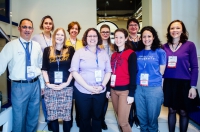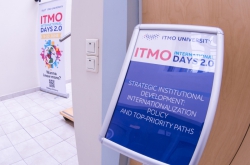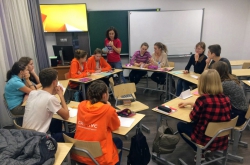Starting in their third year, all undergraduate students at ITMO attend English for Specific Purposes (ESP) classes and Academic Writing classes. ESP classes are currently being designed specifically for students based on their educational programs in order to provide them with specific skills and vocabulary that will help them advance further in their studies and careers. Collaborating with the students’ lecturers and future employers has helped our English language teachers assess exactly what specific English language skills the students at each program need, and they are using this information to develop and to adapt a specific English language course tailored to each field.
Regarding the ESP classes offered last year, one student shared:
“I really liked that we were going through topics that will really come in handy in life. For example, the ability to competently make presentations or write business letters, in my opinion, is very important."

“The content of the ESP course is almost fully consistent with my idea of what it should be. The study of basic terms in physics, mathematics and chemistry is necessary for the professional growth of students. It was fun to find out in the first lesson on this topic that I have almost no idea how to put some basic mathematical expressions into words. The self-presentation course was also informative and useful. We got all the necessary information on how to write a resume, a CV and a cover letter" - said another.
The Foreign Languages Training Center (FLTC) also hosts an ESP conference once every eighteen months. This conference is attended by ESL teachers from around the world and provides an opportunity for them to exchange experiences and share knowledge about ESP, Academic Writing, and EMI practices.

For the last three years, English language fellows from the U.S. State Department have constantly been assigned to ITMO University, offering training for English language teachers and sharing expertise and experience during the academic year.
Academic writing classes, which are also taught in the third year, help students learn the basics of writing essays, reports, and journal articles. They learn how to cite correctly, how to write formally, and essentially anything that will help them prepare for writing high-quality academic texts in English. Students, researchers and faculty members at the university also have the opportunity to approach the Academic Writing Lab, which was launched in early 2016, at any point in the process of writing a paper or an article to ask for advice or assistance. There are also special courses offered by the lab on academic writing or presentation skills.

Students who come to the university already having a very advanced level of English skip the general English classes and enjoy special advanced English classes catered for them on a variety of subjects such as history, speech-writing, and cultural studies.
The Foreign Language Training Center also provides 20 students each year an opportunity to take official Cambridge exams and receive certificates confirming their English language proficiency level.
Not only have the students been given the opportunity to study English at a deeper level, but all of the university staff are offered a chance to improve their English skills by participating in various classes offered in the mornings and evenings. At the beginning of the last academic year, a new course was offered to lecturers of all subjects who are currently teaching or plan to teach in English, to learn more about how to use English as a Medium of Instruction (EMI). They think about the methods of teaching, syllabus design, assessment design and enhancing interaction in the classroom to contribute to their students’ understanding of their course materials when delivered in English.
“The course is different from both academic writing courses and general English. I am very impressed that this is really a professional English course for university teachers. We discussed pedagogical topics in English, gained knowledge of the latest teaching methods, the rules for writing a syllabus for an international audience. Personally, I gained a lot of confidence in my ability to teach in English, learned to use excellent offline and online tools to work with students and a had lot of positive feelings in practical and theoretical classes,” shared Alena Dzhumagulova, lecturer of the Department of Social Sciences and Humanities.

Every year, the Foreign Language Training Center is becoming more and more adept at providing solutions for the English language needs of the university.
“English at ITMO is another thing that shows the best side of the university. Studying English every semester helps to both expand your vocabulary, as well as refresh your theoretical knowledge, but also to prove yourself in the creation of interesting, practical and meaningful projects. It also leads to the accumulation of soft skills required in any professional field. The team of native language teachers gives us an excellent opportunity for weekly conversation practice.” - shares the third year student, Evgenia Ponomareva, from the Faculty of Photonics and Optical Information.




